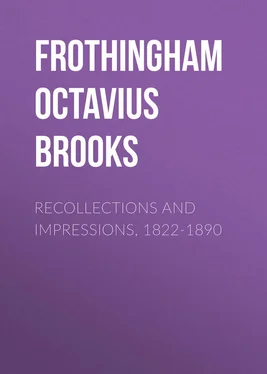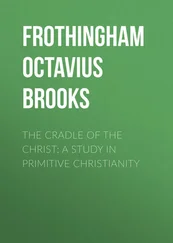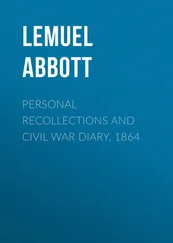Octavius Frothingham - Recollections and Impressions, 1822-1890
Здесь есть возможность читать онлайн «Octavius Frothingham - Recollections and Impressions, 1822-1890» — ознакомительный отрывок электронной книги совершенно бесплатно, а после прочтения отрывка купить полную версию. В некоторых случаях можно слушать аудио, скачать через торрент в формате fb2 и присутствует краткое содержание. Жанр: foreign_antique, foreign_prose, на английском языке. Описание произведения, (предисловие) а так же отзывы посетителей доступны на портале библиотеки ЛибКат.
- Название:Recollections and Impressions, 1822-1890
- Автор:
- Жанр:
- Год:неизвестен
- ISBN:нет данных
- Рейтинг книги:3 / 5. Голосов: 1
-
Избранное:Добавить в избранное
- Отзывы:
-
Ваша оценка:
- 60
- 1
- 2
- 3
- 4
- 5
Recollections and Impressions, 1822-1890: краткое содержание, описание и аннотация
Предлагаем к чтению аннотацию, описание, краткое содержание или предисловие (зависит от того, что написал сам автор книги «Recollections and Impressions, 1822-1890»). Если вы не нашли необходимую информацию о книге — напишите в комментариях, мы постараемся отыскать её.
Recollections and Impressions, 1822-1890 — читать онлайн ознакомительный отрывок
Ниже представлен текст книги, разбитый по страницам. Система сохранения места последней прочитанной страницы, позволяет с удобством читать онлайн бесплатно книгу «Recollections and Impressions, 1822-1890», без необходимости каждый раз заново искать на чём Вы остановились. Поставьте закладку, и сможете в любой момент перейти на страницу, на которой закончили чтение.
Интервал:
Закладка:
The "Lecture-Room" he had little respect for, none at all for the "Variety Show." To every device he wishes a cordial farewell, exclaiming:
Restored! Restored! Well known so long a time,
These buried glories rise as in their prime.
Our tastes may change as fickle fashions-fly,
But art is safe: the Drama cannot die.
More than restored! Whate'er the pen since wrought
Of loftiest, sprightliest, here that wealth has brought.
Whate'er the progress of the age has lent
Of purer taste and comelier ornament, —
To this our temple it transfers its store,
And makes each point shine lovelier than before.
But the drama must be clean:
But more yet, – and how much! We claim a praise
The Playhouse knew not in the ancient days.
Own us, ye hearts with moral purpose warm!
Our word Renewal adds the word Reform.
Come, friends of Virtue! Share the feast we spread.
It loads no spirits, and it heats no head.
But rouses forth each power of mind and soul
With food ambrosial and its fairy bowl.
Hearts are improved by Feeling's play and strife;
Refined amusement humanizes life.
So wrote the Sages, whom the world admired;
So sang the Poets, who the world inspired;
Why in New England's Athens is decried
What old Athenian culture thought its pride?
Thus Righteousness and Peace are made to kiss each other. Art and Virtue walk hand in hand. The sole condition is that art shall be virtuous and that virtue shall be artistic. There was a singular blending in his mind of the sacred and the secular. Perhaps Matthew Arnold's definition of religion as "morality touched with emotion" comes as near expressing Dr. Frothingham's conception as any. There must be morality; that is cardinal; that lies at the foundation of all systems; that must be strict and high. But emotion is indispensable also. This runs into praise, the love of goodness, the worship of the highest. This imparts warmth, glow, passion, the upward lift that inspires. Morality alone is cold, emotion alone is apt to be visionary. But the two united propel the ship, one serving as ballast to keep it steady, and one as sails to catch the winds of heaven.
My mother was an example of pure character. She laid no claim whatever to literary talent. Indeed she had none. I cannot associate her with books of any special description, but I can always associate her with goodness, with humility, sincerity, duty, kindness, pity, and simplicity. Truthfulness was her great virtue, and was saved from bluntness only by her delicate feeling for others and her inborn politeness. The severest rebuke I ever received from her was on account of a sharp arraignment of merchants in a youthful sermon, which to her seemed presumptuous. Her household cares, the nurture of her children (she had seven, five sons and two daughters, all of whom she trained most carefully like a devoted mother), the family visitings, the parish calls, missions among the poor, occupied the day. She would sit for hours knitting or sewing, or in an armchair before the coal fire silently musing. She was quiet, reserved, old-fashioned in her sentiments, but with a great fund of inward strength, which came out on emergencies. I shall always remember her ceaseless solicitude for an unfortunate elder brother of mine who had for years been an anxiety and a trouble. When he died in early manhood, after nursing him tenderly, she softly closed his eyes, and preserved the memory of him in her heart. Her chamber window in the country looked upon his distant grave, the little white stone over which kept him before her eye who was always in her thoughts.
She accepted the existing order of things because it was established, disliking experiments, however humane, for the reason that they had not been tested; and if she had misgivings, she kept them to herself not daring to set up her private feelings in opposition to the will of the Supreme, the question whether the existing order expressed the will of the Supreme never being raised by her.
She was Unitarian, having so been taught, but speculative matters were out of her reach as well as uncongenial with her sphere. Her faith was of the heart, and all the reason for it she had to give was an uplifted life, "unspotted from the world." Of creeds she knew nothing, not that she was deficient in mind, but because they seemed to her to be affairs of criticism, with which she had nothing to do. Her concern was with practical things, and conduct was, with her, more than seven eighths of life. Even the very mild decoction of theology that was administered from Sunday to Sunday in Chauncy Place was sometimes too much for her. She was a practical Christian, if there ever was one.
Her love of nature was genuine. As a young woman she could distinguish the colors of a flying bird. When she had a house of her own in the country, she preferred a spot remote from the world of society; went there as early as possible in the spring, and stayed as late in the autumn as she could. She delighted in the place; loved the air, the trees, the smell of the ground. She enjoyed her garden; liked to see plants grow. Every morning after breakfast she went out to inspect the grounds, and came back laden with modest flowers; in the fall with pine cones, the flame of which she enjoyed. On her last evening, quite unaware of her coming end, she sat on the piazza, and looked at the sunset, wrapped in shawls, though it was midsummer, for she was weak and emaciated but patiently tranquil.
Her habits were simple, not from parsimony but from taste. She cared nothing for decoration or display. She spent no more than was necessary on dress or furniture. She was fond of old-fashioned, solid things. In the midst of abundance, her appetite was for plain food, yet she was no ascetic or prude, but a largehearted, sensible woman, sober and serious but genial too.
Browning makes Paracelsus say:
'T is only when they spring to heaven that angels
Reveal themselves to you; they sit all day
Beside you, and lie down at night by you, —
Who care not for their presence, – muse or sleep,
And all at once they leave you and you know them.
This is in a measure true. Death is a great revealer. Unfortunately it is a great deceiver also, putting wings on very earthly bodies. But in this instance, the qualities were all there in the living form, and all clearly visible to those who sat all day beside my mother. Death did but brush away a little film that hung before distant eyes.
Until near middle life I had the example and advice of these dear spirits. It is my privilege to have their blood in my veins. That was my best endowment, and kept me always hopeful of a better future in the time to come. The dream of a nobler age for literature, art, science, humanity, came directly from my father. The desire to do something to make the dream an actual fact, to prove myself as of some service in the world, came from my mother. His was the love of intellectual liberty. Hers was the passion for practical accomplishments. He was a scholar. She was a worker.
Both had thoughts deeper than they could express. Both were utterly sincere in their calling, and the limitations of their age alone confined their advance. The times were quiet then; the world was small and disconnected; Boston was a little place and shut off even from American cities by difficulties of travel and by exorbitant rates of postage. Thus responsibility was mainly confined to individuals. There were no wearing duties; no perplexing cares; even railroad disturbances did not worry, for there was no railroad speculation, and no railroad system. Hours were early, dinner was at two or half-past, tea at six or seven, the evening ended at ten, and was spent with books, melodious music, or playful games of amusement, not of instruction. There were few social gatherings; balls were very rare, seldom lasting later than eleven o'clock. There was an occasional concert, and here and there a theatre, but there were no great dinner parties. Social problems were exceedingly simple; the classes were divided by lines that nobody attempted to pass over. Socialism was unborn, and labor agitations were unknown. In a word, there was such a thing as leisure, and this was used chiefly for the cultivation of the mind.
Читать дальшеИнтервал:
Закладка:
Похожие книги на «Recollections and Impressions, 1822-1890»
Представляем Вашему вниманию похожие книги на «Recollections and Impressions, 1822-1890» списком для выбора. Мы отобрали схожую по названию и смыслу литературу в надежде предоставить читателям больше вариантов отыскать новые, интересные, ещё непрочитанные произведения.
Обсуждение, отзывы о книге «Recollections and Impressions, 1822-1890» и просто собственные мнения читателей. Оставьте ваши комментарии, напишите, что Вы думаете о произведении, его смысле или главных героях. Укажите что конкретно понравилось, а что нет, и почему Вы так считаете.












